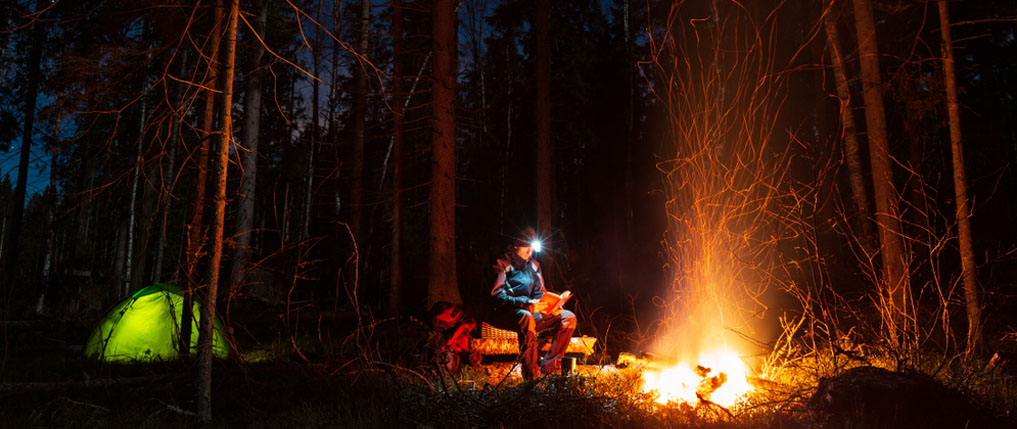How to Master Solo Camping
December 6, 2020

Group camping or just camping with friends requires lots of coordination. From ensuring there are enough provisions for everyone to stay nourished and hydrated to guaranteeing everyone has a nice dry spot inside a tent, planning correctly is more important when camping. Otherwise, it could turn into a disaster – or at least some frustrated campers.
That’s why many folks appreciate solo camping. Solo camping seems intimidating and it can be at first. But once you get the hang of it, you’ll begin to appreciate your time alone with nature. Ready to start camping without the aggravation of coordinating meals and who brings what gear? Here’s some advice to mastering solo camping so you can have the peace of nature all to yourself.
Practice and Graduate to Solo Camping
Don’t believe for a second that you can master solo camping when you haven’t pitched a tent or learned how to start a campfire. Most beginner camping skills can often be learned through a group camping trip (or two or three!) with friends. So put aside your nature-loving introvert tendencies for a moment and go camping with others to gain experience and practice.
Before you go off on your first solo camping adventure, here’s what you must know how to:
- Navigate using a compass and how to read a topographic map
- Forecast and plan for different weather scenarios
- Pitch a tent and rainfly correctly
- Start a campfire
- Find (or make) a clean water source
- Safely handle wildlife (bears and other predators, especially)
- Address injuries and understand basic first aid
Other than these basics, you might also consider taking a class on wilderness survival skills. Winter camping especially comes with an entirely new set of challenges, avoiding hypothermia and even avalanches.
Get Used to the Quiet (and All the Sounds of Nature)
At night especially, when it’s deafeningly quiet, your ears can pick up the tiniest sounds, sending your imagination wandering with fear. Instead of worrying, try to calm your mind and not panic. The absolute best way to turn off that trickster brain at the end of the day? Hit the sack utterly exhausted after a long day of hiking or other physical activity.
Pack Light and Practical

Since you won’t have fellow friends to help haul in equipment and gear, pack light and think practical. The advantage of solo camping is that you just need enough for yourself. Consider investing in a one-person backpacking tent or a bivy sack. Hammock camping is a wonderfully lightweight alternative and a comfortable one at that! Plus, without lying on rocks, it means you can eliminate a sleeping pad. However, in cold weather, you’ll still need warmth with an insulating underquilt.
Prepare a cooler or overnight sack with some no-cook camping meals. Whether it’s pre-made food you brought from home or pre-packaged dehydrated meal kits from a local recreation store, packing easy meals will provide enough nutrition for just you. Be sure to follow the Leave No Trace principles, too, making sure to pack out anything you brought and leaving your site better than before.
Occupy Yourself with Activities
One thing you should pack is a few activities to keep you occupied. Camping is often a very communal experience, sharing stories around the campfire and playing card games. However, when solo camping, you’ll have a lot of quiet time all to yourself. While some of us are perfectly happy to ponder life’s mysteries hours upon hours, others might appreciate an activity or two to keep themselves occupied.
Choose a practical activity that doesn’t take up much room or add weight to your pack. Bring along a paperback book or a sketchpad to capture the local flora and fauna you find at the site. You could even bring along a knife and try your hand at whittling – whatever will engage your mind (and help you fall asleep in the evenings).
Plan for Emergencies
Without anyone to help you out of a jam, solo camping requires you to plan for emergencies. For starters, make sure to share your plans with someone you trust, letting them know your exact itinerary and when you plan to return.
It’s also wise to pack a first aid kit and an emergency device. It’s better to be better safe than sorry. Especially when solo camping out in the wilderness, a cell phone can let family know you’re safe. Protect your phone with an Apple phone case or any case suitable for your device to keep it secure in case of accidental drops. And in the event you lose power or cell service and become lost or injured
If something goes awry, have an escape plan. This is one of the advantages of solo camping close to home; however, you can also seek last-minute shelter at nearby hotels as well.
Solo camping is not reserved for highly skilled campers. As long as you’re prepared, it’s possible. And once you get in tune with the silence and learn to appreciate being all alone, it’s a gratifying solitary experience.
Ready to try your first solo camping trip? Check out ReserveAmerica or Recreation.gov and get out there!

SIGN UP FOR EXCLUSIVE OFFERS
Sign up for our newsletter and get exclusive access to new product launches, special offers and much more.
RELATED BLOGS














